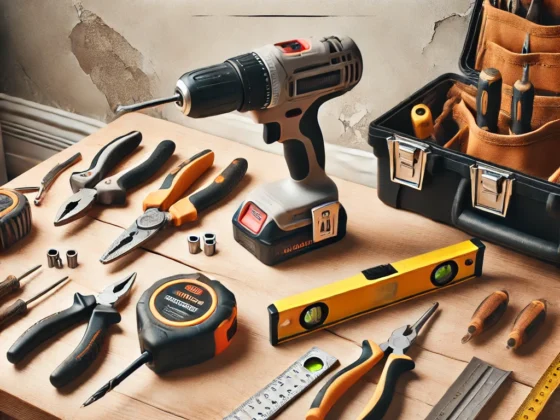Home repairs can often seem straightforward, but knowing whether to call a handyman or a specialist can save you time, money, and a lot of headaches. Understanding the true cost of home repairs—from minor fixes to larger projects—requires balancing several factors: pricing, skills required, and long-term maintenance.
This guide will help you determine when a handyman is the most cost-effective option and when a specialist is needed for more complex or specialized tasks. Whether you’re fixing a leaky faucet or rewiring part of your home, knowing who to hire can prevent costly mistakes and ensure the job is done right.
When to Call a Handyman: Tackling General Home Repairs
Handymen are often the best choice for general home repairs and small to mid-sized projects. They’re skilled in a variety of tasks, offering a cost-effective solution for homeowners who need help with multiple jobs that don’t require a licensed specialist. Here’s when you should call a handyman:
1. Minor Plumbing and Electrical Repairs
For small issues like fixing a leaky faucet, installing a new light fixture, or replacing an outlet, a handyman is usually the most affordable option. These tasks are simple enough that they don’t require the expertise of a specialized plumber or electrician but still need a professional touch to ensure safety and functionality.
- Average Cost for a Handyman: $50 to $100 per hour, depending on location and job complexity.
- Cost of a Specialist (Plumber or Electrician): $75 to $200 per hour, often with additional service fees.
2. Carpentry and Woodworking Projects
Handymen excel in handling small to medium carpentry tasks such as repairing doors, installing custom shelving, or assembling furniture. Unless your project involves load-bearing structures or intricate woodworking, a handyman will provide a budget-friendly solution without sacrificing quality.
- Average Handyman Cost for Carpentry: $30 to $60 per hour.
- Specialist Cost (Carpenter): $75 to $150 per hour.
3. Painting and Drywall Repairs
From patching holes in drywall to repainting a room, handymen are ideal for interior painting and wall repairs. They can also handle minor exterior touch-ups. If you need a larger-scale painting project, such as a multi-story home or a complex texture finish, you may need a painting contractor.
- Average Handyman Cost for Painting: $200 to $500 per room (depending on size).
- Specialist Cost (Painting Contractor): $500 to $1,500 per room.
4. General Home Maintenance
Routine home maintenance tasks—like cleaning gutters, replacing weather stripping, or fixing a fence—are perfect for handymen. These tasks don’t require specialized licensing but do need experience and the right tools.
- Handyman Maintenance Cost: $100 to $300 per project.
- Specialist Cost (Landscapers, Roofing Specialists, etc.): $300 to $800 for similar tasks.
Why a Handyman Is Cost-Effective for These Tasks:
Handymen are multi-skilled professionals who can tackle several smaller jobs in one visit, saving you the time and money that would be spent hiring multiple specialists. This versatility makes them the go-to solution for everyday home repairs.
When to Call a Specialist: Complex Repairs and Safety Concerns
While a handyman can handle many general repairs, some jobs require the expertise and certifications of a specialist. These tasks typically involve more complex systems (like your home’s electrical wiring or plumbing) or areas where safety is a top concern.
1. Major Electrical Work
If your project involves rewiring, upgrading your electrical panel, or dealing with complex electrical systems, you need a licensed electrician. Improper electrical work can lead to dangerous consequences, including fires and injuries, so it’s important to invest in a specialist for these tasks.
- Specialist Cost (Electrician): $75 to $200 per hour, depending on the scope of the project.
2. Plumbing System Overhauls
While a handyman can fix minor leaks and install new fixtures, more significant plumbing issues—such as pipe replacement, sewer line repairs, or hot water heater installations—require a licensed plumber. These jobs often need specialized tools and training to comply with local codes and ensure proper functioning.
- Specialist Cost (Plumber): $75 to $150 per hour, plus material costs.
3. Structural Repairs
For anything related to the structural integrity of your home, such as foundation work, roof repairs, or building load-bearing walls, hiring a licensed contractor is crucial. These projects require engineering knowledge, proper permits, and adherence to strict building codes.
- Specialist Cost (Contractor): Varies greatly, from $1,000 to $10,000+ depending on the project’s size and complexity.
4. HVAC Repairs
While handymen can replace filters and clean ducts, complex HVAC work—such as installing new systems or repairing central heating and cooling units—requires a certified HVAC technician. HVAC systems are expensive and intricate, and improper repairs can shorten the lifespan of the system or create safety hazards.
- Specialist Cost (HVAC Technician): $75 to $150 per hour, with system installations costing several thousand dollars.
DIY Pitfalls: When “Do It Yourself” Can Cost You More
Many homeowners are tempted to take the DIY route to save money on repairs. However, DIY projects can quickly turn into costly disasters if not handled properly. Here are some common pitfalls to be aware of:
1. Lack of Specialized Tools
Even for small repairs, having the right tools is essential. Without the proper equipment, you risk damaging materials, wasting time, and even injuring yourself. Handymen and specialists have access to professional-grade tools that most homeowners do not.
2. Underestimating the Complexity
What seems like a small project often turns out to be more complicated than expected. For example, fixing a simple leak might reveal a larger plumbing issue. A handyman or specialist has the training to spot and solve hidden problems before they escalate.
3. Code Violations and Safety Risks
DIY electrical, plumbing, or structural work can result in code violations, which might come back to haunt you if you plan to sell your home. More importantly, poor workmanship can create safety hazards for you and your family. Hiring a licensed specialist ensures your repairs meet local building codes and safety standards.
How to Save Money While Ensuring Quality Repairs
Balancing cost and quality is key when managing home repairs. Here are some tips to help you save money without sacrificing safety or workmanship:
1. Bundle Smaller Tasks for a Handyman
If you have multiple small projects, it’s more cost-effective to hire a handyman to complete them all in one visit. This saves time and reduces hourly fees.
2. Get Multiple Quotes
Before committing to a contractor or handyman, gather multiple estimates to compare prices. This ensures you’re getting a fair deal and helps you understand the going rate for the work you need.
3. Invest in Preventive Maintenance
Preventive maintenance can save you from larger, costlier repairs down the line. Regularly maintaining your home’s major systems (like HVAC and plumbing) prevents issues from escalating, ultimately saving you money.
Conclusion: Handyman vs. Specialist—Which Should You Hire?
The decision between hiring a handyman or a specialist comes down to the complexity and safety requirements of the project. For general, non-specialized repairs, a handyman offers a cost-effective and reliable solution. However, for complex systems and major structural work, it’s worth investing in a certified specialist to ensure the job is done safely and up to code.
By understanding the true cost of home repairs and knowing when to call a handyman versus a specialist, you can save both time and money—while ensuring your home is well-maintained and safe.




